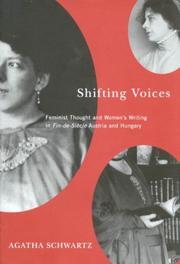| Listing 1 - 4 of 4 |
Sort by
|
Book
ISBN: 3631318936 9783631318935 Year: 1997 Publisher: Frankfurt am Main Lang
Abstract | Keywords | Export | Availability | Bookmark
 Loading...
Loading...Choose an application
- Reference Manager
- EndNote
- RefWorks (Direct export to RefWorks)
Musil, Robert --- Dystopies --- Feminismus. --- Impliziter Leser. --- Leserin. --- Littérature allemande --- Utopias in literature. --- Utopie. --- Utopies --- Dans la littérature. --- Thèmes, motifs --- Musil, Robert (1880-1942). --- Musil, Robert, --- Musil, Robert. --- Mann ohne Eigenschaften (Musil, Robert). --- Mann ohne Eigenschaften.

ISBN: 1282850466 9786612850462 0773560521 9780773560529 0773532862 9780773532862 9780773532861 9781282850460 6612850469 0773578226 Year: 2008 Publisher: Montreal ; Ithaca, NY : McGill-Queen's University Press,
Abstract | Keywords | Export | Availability | Bookmark
 Loading...
Loading...Choose an application
- Reference Manager
- EndNote
- RefWorks (Direct export to RefWorks)
The organized women's movement in Austria-Hungary became increasingly important with the rise of modernism and feminist concerns ranging from women's legal and political rights, access to education, professional opportunities, economic independence, and sexual freedom found expression in print. Agatha Schwartz analyses the connections between the women's movements and women's writing in Austria and Hungary to explore some differences between works written in Austria and those coming from Hungary, whose urban culture was younger. She provides critiques of major works of fiction and theory by authors such as Rosa Mayreder, Grete Meisel-Hess, Margit Kaffka and Szikra.
Feminism --- Feminism and literature --- Feminist literature --- Hungarian literature --- Austrian literature --- Literature --- German literature --- Magyar literature --- Balkan literature --- Emancipation of women --- Feminist movement --- Women --- Women's lib --- Women's liberation --- Women's liberation movement --- Women's movement --- Social movements --- Anti-feminism --- History. --- History and criticism. --- Women authors --- Austrian authors --- Emancipation --- Literature and feminism
Book
ISBN: 077660726X 9786613667861 0776618970 1280690925 9780776618975 9780776607269 9780776618968 0776618962 Year: 2010 Publisher: Ottawa University of Ottawa Press
Abstract | Keywords | Export | Availability | Bookmark
 Loading...
Loading...Choose an application
- Reference Manager
- EndNote
- RefWorks (Direct export to RefWorks)
"At the end of the nineteenth century, Austro-Hungarian society was undergoing a significant re-evaluation of gender roles and identities. Debates on these issues revealed deep anxieties within the multi-ethnic empire that did not resolve themselves with its dissolution in 1918. The concepts of gender and modernity were modified by the various regimes that ruled the empire's successor states in the twentieth century and have been redefined again in the post-Communist period, but the Habsburg Monarchy's influence on gender and modernity in Central Europe is still palpable." "With a truly interdisciplinary approach ?drawing on the fields of women's studies, gender studies, sociology, history, literature, art, and psychoanalysis t?hat touches on gender roles, sexual identities, misogyny, painting, writing, minorities ?this volume explores the lasting impact of the Austro-Hungarian Empire in contemporary Central Europe, which is fraught with gender conflict and tension between modernist and anti-modernist forces."--BOOK JACKET.
Sex role --- Gender role --- Sex (Psychology) --- Sex differences (Psychology) --- Social role --- Gender expression --- Sexism --- Gender roles --- Gendered role --- Gendered roles --- Role, Gender --- Role, Gendered --- Role, Sex --- Roles, Gender --- Roles, Gendered --- Roles, Sex --- Sex roles --- Austria --- Civilization
Book
ISBN: 9781572411876 Year: 2014 Publisher: Riverside, California : Ariadne Press,
Abstract | Keywords | Export | Availability | Bookmark
 Loading...
Loading...Choose an application
- Reference Manager
- EndNote
- RefWorks (Direct export to RefWorks)
Austrian literature --- Hungarian literature --- Feminist literature --- Feminism and literature --- Feminism --- Littérature autrichienne --- Ecrits de femmes hongroises --- Féminisme --- Féminisme et littérature --- Women authors --- History and criticism. --- History and criticism --- History --- Femmes écrivains --- HIistoire et critique --- Histoire et critique --- Documentation --- Histoire
| Listing 1 - 4 of 4 |
Sort by
|

 Search
Search Feedback
Feedback About UniCat
About UniCat  Help
Help News
News